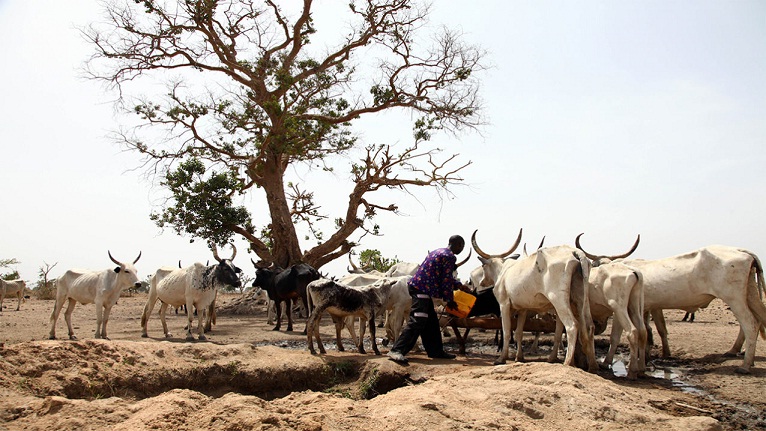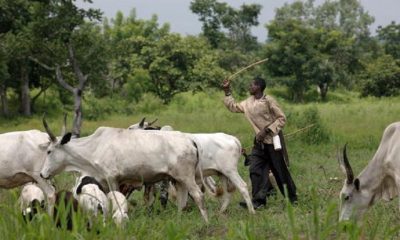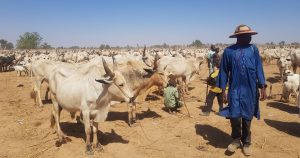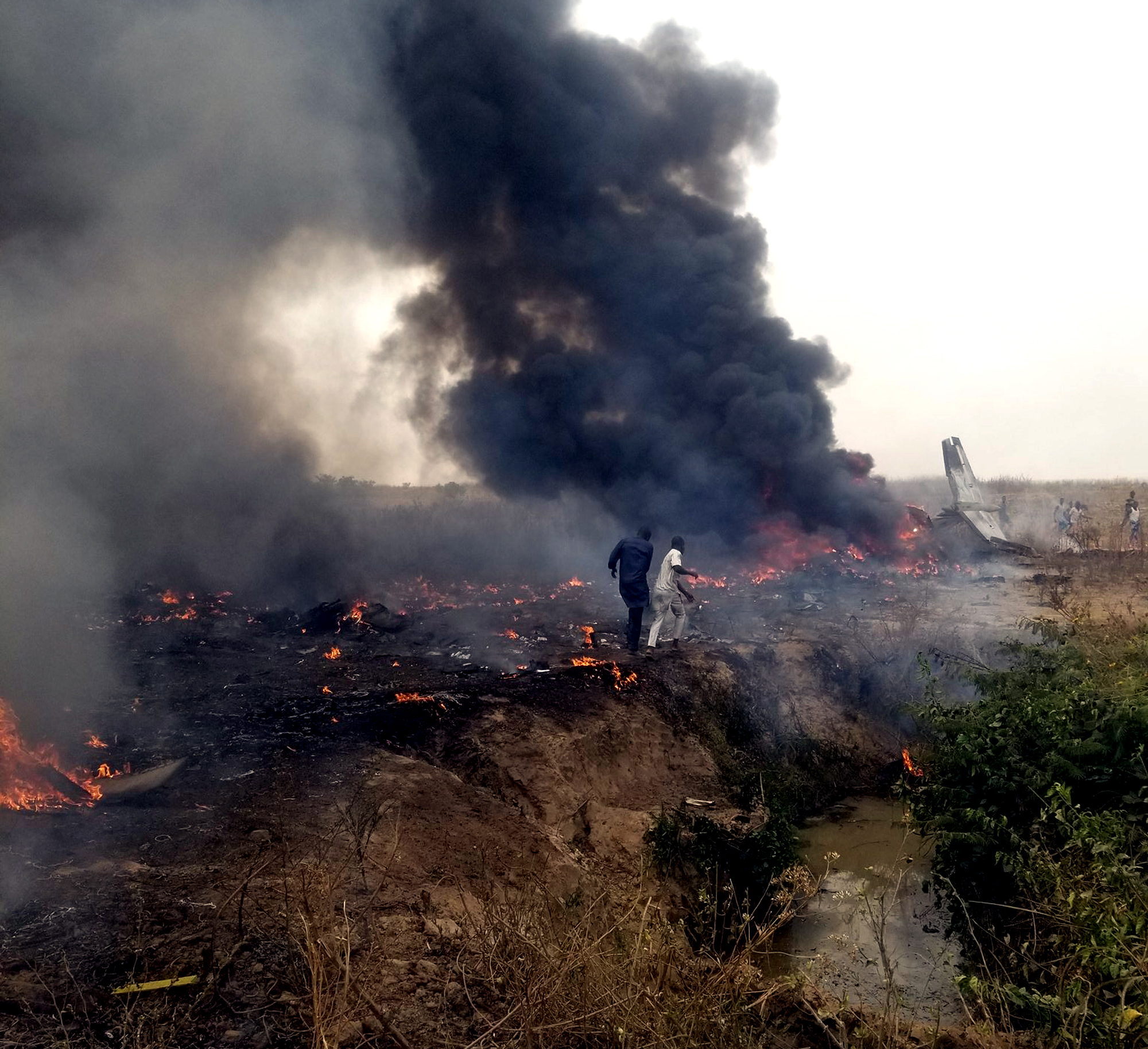FEATURES
Stemming the Tide of Farmer-Herder Conflict in the Middle-Belt

By Chris Gaga
Even as most Nigerians rolled out the drums in commemoration of the country’s 59 years as an independent nation, a section of the country still hold the view that there wasn’t much to celebrate after all.
Although the country may not have lived to the fullest dreams of its heroes past, it has nevertheless remained a united, indivisible, progressive and soverign entity regardless of the numerous challenges threatening the corporate existence of its people.
No doubt, in the past 59 years of the country’s independence, wars have been fought, governments have been overthrown, political independence may have been won, economic progress and development achieved in different stratas as well as the challenges therewith.
However, the wave of terrorism, farmer-herder conflicts, kidnapping, militia, and the other criminal activities that have infiltrated our geographical regions, challenging the country’s peace, security and unity remain a core national agenda.
Is it the Boko Haram insurgence in the country’s north east?, the Niger-Delta militia, kidnappings?, or most particularly the farmer herder conflicts in Nigeria’s Middle Belt ?, religious and ethnic crisis?, the challenges appear daunting.
In the Middle – Belt region and particularly, Benue State, messages, or wishes that the farmer-herder conflicts and other related crimes be squashed to allow the sweet wave of peace flourish unceasingly again in the region, featured most prominently on the country’s 59th Independence Day anniversary.
A former Permanent Secretary in the Benue State Civil Service, Engr. Peter Torjum in a chat with DAILY ASSET in Makurdi, called on the government to ensure the return of all displaced persons from the conflicts to their their ancestral homes. Most victims of the farmer -herder conflicts have been in IDPs’ camps. He said as the country attained 59 years as an independent state, the government needed to be more proactive especially on issues that bother on the lives, security and safety of citizens.
“At 59, Nigeria has achieved alot in terms of education, infrastructural development, in terms of conflict resolution, but you see, the herder-farmer crisis is a very critical thing which the federal government has tried to profer solutions, but needs to do more to salvage the situation of Benue State so that these people that have been displaced, the IDPs can go home.
” In Kwande LGA, where I hail from from, five council wards have been displaced since 2012. Right now, , the Fulani herdsmen are grazing, their cattle are destroying crops and nobody is doing anything about it.
We have the open grazing prohibition law, but I don’t know whether it is implemented only in cities, because in the rural areas, the herdsmen are still grazing in the open,” he stressed .
He advised the federal government to do more, to rehabilitate those displaced farmers so there will security for farmers to go back to their ancestral homes.
Hajia Hauwa Isah, the President, Women Wing of the Jama’atul Nasiru Islam (JNI), under Supreme Council of Islamic Affairs, in a chat advised that everything thing should be done by the government to preserve the economic b activities of both the farmers and herders.
Hajiah Hauwa was optimistic that if government would collaborate with stakeholders like the International NGO working for the transformation of peace in Benue and the North Central region, the conflict will be a thing of the past.
She called on the government to return power to the people especially in situations of crisis such as the farmer – herder crisis, noting that when community leaders and it’s people are empowered to play critical roles in crisis situations, the chances of resolving the crisis would be brighter.
“We give glory to God for allowing us with this year’s Independence Day celebration. For the first time in Benue state, we have a serious crisis on ground – the farmer-herder conflict which by the grace of God is taking a different dimension of peace in the communities.
“We are happy that Search for Common Ground came in with a program to enlighten, educate and bring the two parties together to see how they can resolve the issue of farmer – herder conflict in Benue State and we believe that as stakeholders in this conflict, we are making progress and we believe that one day it shall come to pass, because we need to live together, tolerate one another, live in peace and harmony, she stated.
“Benue is a lovely state, a peaceful state, a place of harmony, we just pray that things will take rightful shape and I appreciate Search for Common Ground for putting in more efforts to make sure that this crisis is resolved.
“The Government of Nigeria as much as possible should remember that they are government of the people, voted in by the people. So when community issues concerning the people come up, let them support community leaders to take care of their problem. People in the communities know their problems better, they know where it pinches them more. So if government is going 2 come in, its for them to assist,” she said.
Benue state Governor, Samuel Ortom in his Independence message called for peace and purposeful unity if the critical security challenges confronting different regions of the country must be tackled. This peace crusade especially, signals a genuine crave for harmonious co-existence amongst both the herders and farmers.
Governor Samuel Ortom insisted that, “only sustained synergy between the Federal Government and states, as well as other stakeholders can lead to victory against terrorism and other criminal acts in parts of the country.”
The governor’s emphasis that criminality will be fought with vehemence is another pointer to entrenching peace
“There will be no hiding place for enemies of peace as he will not surrender the state to criminals.
His reaffirmation that his government was committed to addressing youth restiveness by developing the agriculture value chain to engage young people in rewarding ventures has widely commended by stakeholders
Suffice to say that, it may not be Uhuru yet, but Nigeria’s 59 years as one indivisible nation despite is an indication of remarkable progress. The country may not have gotten to where it is expected to be, but it is definitely not where it was at independence in 1960.
While our leaders strive to keep Nigeria one amidst the common challenge of insecurity, it is imperative for all citizens to begin to see themselves as key stakeholders in the peace project of the country
President Muhamadu Buhari’s call for the unity of the country during his Independence Broadcast on Tuesday be taken seriously by his administration. He should follow his speech with decisive actions on those issues and elements that tend to tear this nation apart, one of which is the farmer-herder conflict.
The President’s conviction that Nigeria will emerge stronger from its present challenges especially that of insecurity has rekindled the hopes of many citizens, but more action and less is what the nation needs.

FEATURES
ECOWAS @ 50: Celebrating Resilience, Unsung Heroic Achievements

By Fortune Abang
The establishment of the Economic Community of West African State (ECOWAS) on May 28, 1975, under auspices of Treaty of Lagos, marked a new regional chapter and charter.By virtue of the Treaty of Lagos, ECOWAS, comprising 16 West African countries at inception, became Africa’s pioneer Regional Economic Community (REC).
For the benefit of hindsight, ECOWAS founding countries are Nigeria, Benin, Burkina Faso, Cabo Verde, Cote d’Ivoire, The Gambia, Ghana, Guinea, Guinea-Bissau, Liberia, Mali, Niger, Senegal, Sierra Leone, Mauritania and Togo. However, Mauritania formally withdrew from the bloc in 2000, bringing the number of countries to 15.The Treaty of Lagos aims at promoting economic co-operation and integration among the ECOWAS member states with focus on achieving collective self-sufficiency and improving the citizens’ standard of living.Nonetheless, amidst successes so far recorded, the community’s heroic achievements remain unsung 50 years after.Recently, at an event organised by ECOWAS and hosted by the Nigerian Institute of International Affairs (NIIA) to commemorate ECOWAS at 50, its founding fathers, regional and sub-regional leaders, as well as diplomats, underscored the need for continuous growth in strength, unity and purpose of the community.The stakeholders prayed for ECOWAS to march towards peace, prosperity and progress in the spirit of 1975 cooperation, solidarity and of hope that has never been forgotten.They recounted significant progress the community made in terms of implementation of policies and programmes, protocols and operations to stabilise entities such as Liberia, Sierra Leone and Guinea Bissau.More so, they identified other achievements to include trade liberalisation, introduction of policies to reduce trade barriers and promotion of intra-regional trade; thus increasing trade among member states and helping to promote economic growth and development.Regrettably, they say the community failed in achieving a common currency.Observers say the community still faces security challenges such as terrorism, kidnapping, various criminal activities and various activities of man’s inhumanity to man.According to stakeholders, the recent withdrawal by the Alliance of Sahel States (AES)– Mali, Burkina Faso and Niger– from the community poses great concern to ECOWAS as it marks 50 years of existence.Speaking during the ceremony, a former Head of State, retired Gen. Yakubu Gowon, said ECOWAS had evolved into a cornerstone of regional stability and a powerful emblem of African resilience and unity.According to him, the theme of ECOWAS at 50: “Stronger Together for a Brighter Future”, reflects the richness of African culture and tradition.He narrated the diverse views about the founding of ECOWAS on May 28, 1975 under his leadership then as Nigeria’s Head of State.“The view when we started was to promote good governance; there were military and other democratic governments, but the military ensured we did things democratically, militarily democratically.“Yes, with the help of all of us, there will be democratic and secured governments throughout the region; let us not forget the many challenges we have faced over the past 50 years.“There are political crises, coup d’etat, civil wars, economic crunch, pandemics, terrorism and pressure of globalisation, yet through it all, ECOWAS has endured.“It has adapted to changing circumstances, undertaken critical reforms and consistently renewed commitment to the founding ideas that bind us together.“However, today is not only a day to celebrate the past, but it is a moment to reflect upon the present and chart course for the future,” he said.President Bola Tinubu and Chairman of ECOWAS Heads of State and Government, in a keynote address, stressed the need for West African leaders to sustain the legacies of ECOWAS’s founding fathers.He urged the leaders to continue to look beyond artificial borders created by colonialists and embrace one another as a family.Tinubu said that the founding fathers foresaw a more united, harmonious, and purpose-driven regional bloc that would benefit many generations.“In 1975, our founding leaders envisioned a West Africa where borders unite rather than divide a region of free movement, thriving trade, and peaceful coexistence; that vision is still alive.“The regional bloc has lived up to the founders’ expectations in many respects, including peacekeeping, trade liberalisation, free movement of citizens and working together to tackle security issues and global pandemics.“ECOWAS is a beacon of African unity; in overcoming colonial legacies, we brought together Anglophone, Francophone, and Lusophone nations under one vision, an achievement of global significance,” he said.On his part, Mr Mahmoud Youssouf, Chairperson of African Union Commission (AUC), extolled ECOWAS for acting decisively as guardian of peace and builder of dialogue amidst regional challenges.“Fifty years ago, ECOWAS emerged from the bold imagination of visionary leaders who understood, long before many others, that Africa’s strength would be forged not in fragmentation, but in unity.“This vision is embodied in ECOWAS; amid political challenges, pandemics, economic disruptions and the shifting tides of globalisation, ECOWAS has remained steadfast.“Not without trials but never without resolve; in the face of adversity, ECOWAS has not stood idle; it has acted decisively as a guardian of peace and a builder of dialogue,” Youssouf said.In line with this, Pioneer President of ECOWAS Commission, Dr Mohamed Ibn Chambas, expressed confidence that ECOWAS under Tinubu’s leadership, would continue to reawaken the community’s ideals and principles.“Tinubu is very strong in his opposition to military interventions because having elected democratic governments over any other form of government, including military intervention, is the only accepted form of governance globally,” Chambas said.On his part, the Association of Retired Career Ambassadors of Nigeria (ARCAN) hailed ECOWAS for its resilience and notable achievements recorded over the past 50 years amidst numerous challengesAccording to ARCAN’s National President, Amb. Joe Keshi (OON), the 2021 African Integration Report ranked ECOWAS as the best performing among Africa’s eight RECs.“The key achievements include the 1979 Protocol on Free Movement that allows citizens visa-free travel, right to stay in other member states for up to 90 days, ECOWAS passport and Biometric Identification Card Scheme that facilitated regional mobility.“The ECOWAS Trade Liberalisation Scheme (ETLS) promotes duty-free trade within a regional market of approximately 446 million people, boosting economic integration and cooperation among member states.“Infrastructure successes such as the Lagos-Abidjan Highway, the West African Gas Pipeline and sustainable energy projects were also highlighted,” Keshi said.What’s more, Amb. Yusuf Tuggar, Minister of Foreign Affairs and Chair of ECOWAS Council of Ministers, reiterated the bloc would continue to lead as a model bloc among Africa’s regional economic communities.“ECOWAS stands today as a leading model among Africa’s regional economic communities with innovations such as the community levy which has enabled financial autonomy, ambitious programmes and infrastructure projects.“Other innovations are the ETLS, SIGMAT system for customs data integration, Lagos-Abidjan and Abidjan-Dakar transport corridors, West African Power Pool, and framework for the African-Atlantic Gas Pipeline, which embody ECOWAS’s mission of economic and infrastructural connectivity,” he said.Amb. Kalilou Traore, Ambassador of Côte d’Ivoire to Nigeria, said ECOWAS at 50 marked a big moment to celebrate what the community had done so far.“We have had success in many areas; also, we experienced some failures, we need to learn from all those things and project ourselves in the future to make ECOWAS a better place.“ECOWAS has been able to create a regional market. What we are trying to do now at continental level for ACFTA, we already have it in the ECOWAS region, which is a big achievement,” Traore said.The ambassador paid tribute to the founding fathers of ECOWAS led by Gowon of Nigeria and the late Eyadema of Togo.He praised their vision and commitment as standards that should be encouraged to sustain growth of the bloc.All in all, stakeholders agree that ECOWAS member states should continue to work closely in order to break the chains of underdevelopment and lay the foundation for a self-sustaining, prosperous region.They say synergy is required in fostering economic integration, strengthening political and diplomatic cooperation as well as promoting peace and security in the region.(NAN)FEATURES
We Have Made Undeniable Progress: President Bola Tinubu’s Second Anniversary Speech

Fellow Nigerians, as we mark the second anniversary of our administration, I salute your resilience and undaunted spirit. Two years ago, you entrusted me with the sacred responsibility to lead our nation at a time of historic challenges. Together, we have faced these headwinds with courage and determination.
The economic and general situation of the country I inherited required that we redirect the country’s affairs with a bold and new vision.
I immediately implemented two necessary policies to stop our country from further drifting into the precipice. It was apparent that if the federal government and the other two tiers of government must remain viable and cater to the citizens’ welfare, we must do away with decades-long fuel subsidies and the corruption-ridden multiple foreign exchange windows. The two were no longer sustainable and have become a chokehold on our nation’s neck, strangling our nation’s future.While our administration has implemented the reforms to restore and reinvigorate our national economy and strengthen our social fabric as a strong and united country, I must thank my fellow citizens for your unrelenting support and belief in the grand vision we share to uplift our nation and renew our collective hopes and aspirations.
We are halfway through the journey that began 24 months ago. Today, May 29, 2025, offers our administration the opportunity to share again how far we have gone and our progress in steering our country along the critical path of socio-economic development.
When we embarked on this journey, propelled by a burst of hope and abiding faith in Nigeria’s unity and progress, I made a pledge before God and fellow countrymen and women to confront Nigeria’s challenges head-on by rebuilding trust, fostering prosperity, and restoring our nation’s economic health. Today, I proudly affirm that our economic reforms are working. We are on course to building a greater, more economically stable nation.
Under our Renewed Hope Agenda, our administration pledged to tackle economic instability, improve security nationwide, reduce corruption, reform governance, and lift our people out of poverty.
While implementing the reforms necessary to strengthen our economy and deliver shared prosperity, we have remained honest by acknowledging some of the difficulties experienced by our compatriots and families. We do not take your patience for granted. I must restate that the only alternative to the reforms our administration initiated was a fiscal crisis that would have bred runaway inflation, external debt default, crippling fuel shortages, a plunging Naira, and an economy in a free-fall.
Despite the bump in the cost of living, we have made undeniable progress.
Inflation has begun to ease, with rice prices and other staples declining. The oil and gas sector is recovering; rig counts are up by over 400% in 2025 compared to 2021, and over $8 billion in new investments have been committed. We have stabilised our economy and are now better positioned for growth and prepared to withstand global shocks.
In 2025, we remain on track with our fiscal targets. Gross proceeds per barrel from crude oil are broadly aligned with our forecasts as we intensify our efforts to ramp up production. Our fiscal deficit has narrowed sharply from 5.4% of GDP in 2023 to 3.0% in 2024. We achieved this through improved revenue generation and greater transparency in government finances. In the first quarter of this year, we recorded over N6 trillion in revenue.
We have discontinued Ways & Means financing, which has been a major contributor to high and sticky inflation. The NNPC, no longer burdened by unsustainable fuel subsidies, is now a net contributor to the Federation Account. We are also achieving fuel supply security through local refining.
Our debt position is improving. While foreign exchange revaluation pushed our debt-to-GDP ratio to around 53%, our debt service-to-revenue ratio dropped from nearly 100% in 2022 to under 40% by 2024. We paid off our IMF obligations and grew our net external reserves by almost 500% from $4 billion in 2023 to over $23 billion by the end of 2024.
Thanks to our reforms, state revenue increased by over N6 trillion in 2024, ensuring that subnational governments can reduce their debt burden, meet salaries and pension obligations on a timely basis, and invest more in critical infrastructure and human capital development.
One of our administration’s most impactful achievements is our bold tax reform agenda, which is already yielding results. By the end of 2024, our tax-to-GDP ratio rose from 10% to over 13.5%, a remarkable leap in just one year. This was not by accident. It results from deliberate improvement in our tax administration and policies designed to make our tax system fairer, more efficient, and more growth-oriented.
We are eliminating the burden of multiple taxation, making it easier for small businesses to grow and join the formal economy. The tax reforms will protect low-income households and support workers by expanding their disposable income. Essential goods and services such as food, education, and healthcare will now attract 0% VAT. Rent, public transportation, and renewable energy will be fully exempted from VAT to reduce household costs further.
We are ending the era of wasteful and opaque tax waivers. Instead, we have introduced targeted and transparent incentives supporting high-impact manufacturing, technology, and agriculture sectors. These reforms are not just about revenue but about stimulating inclusive economic growth.
There is a deliberate focus on our youth, who a friendlier tax environment for digital jobs and remote work will empower. Through export incentives, Nigerian businesses will be able to compete globally. Our National Single Window project streamlines international trade, reduces delays, and enhances Nigeria’s competitiveness.
To promote fairness and accountability, we are establishing a Tax Ombudsman, an independent institution that will protect vulnerable taxpayers and ensure the system works for everyone, especially small businesses.
Most importantly, we are laying the foundation for a more sustainable future by introducing a new national fiscal policy. This strategic framework will guide our approach to fair taxation, responsible borrowing, and disciplined spending.
These reforms are designed to reduce the cost of living, promote economic justice, and build a business-friendly economy that attracts investment and supports every Nigerian. Together, we are creating a system where prosperity is shared, and no one is left behind.
We have breathed new life into the Solid Minerals sector as part of our efforts to diversify the economy. Revenue has increased phenomenally, and investors are setting up processing plants as the sector dumps the old pit-to-port policy and embraces a new value-added policy.
We have also repositioned our health sector despite all odds.
Over 1,000 Primary Health Centres are being revitalised nationwide. An additional 5,500 PHCs are being upgraded under our Renewed Hope Health Agenda. We are establishing Six new cancer treatment centres. Three are ready. We offer free dialysis services in pilot tertiary hospitals and subsidise the service in others. Under the Presidential Maternal Health Initiative, over 4,000 women have undergone free cesarean sections. Lastly, we have expanded Health Insurance Coverage from 16 million to 20 million within two years.
As a result of our bold and deliberate policies, the economy is growing stronger again. Real GDP rose by 4.6% in Q4 2024, with full-year growth of 3.4%. This is one of the strongest in a decade.
Without a responsive and reliable national security infrastructure that can protect lives and properties, our economy will not perform optimally, and those who seek to harm us will impair and disrupt our way of life. Our administration is committed to the security and safety of our people. For our government, protecting our people and their peaceful way of life is the utmost priority.
Since I assumed our country’s leadership, our administration has improved collaboration among security agencies, increased intelligence-driven operations, and better ensured the welfare of our armed forces and security personnel. I use this opportunity to salute the courage and everyday sacrifice of our service men and women. We may not always witness the tremendous efforts they make to keep us safe, but we benefit every day from the results of their dedication. Even if we do not thank them often enough, they willingly face danger so we can go about our lives freely and without fear.
Our military, police, and intelligence agencies are committed to always responding to emerging security threats and new challenges because it is the patriotic duty they owe a grateful nation.
Amid the new security challenges, we can report some successes. In some areas of the northwest, hitherto under the control of bandits, our gallant armed forces have restored order, reducing and eliminating threats to lives and livelihoods. With the success achieved, farmers are back tilling the land to feed us. Highways, hitherto dangerous for travellers, have become safer. Our security agencies have succeeded many times in rescuing the abducted citizens from the hands of their tormentors. I promise you, we shall remain vigilant, as I told security chiefs during the last meeting to up their game and collaborate to end this plague of evil men. Every Nigerian deserves to live without fear.
Outside of Security, we have prioritised human capital development as a central pillar of our national development strategy.
To this end, we have significantly expanded access to quality education through infrastructure investments and the student loan scheme to support indigent students in tertiary institutions. Through the Renewed Hope Health initiative, our administration has begun equipping health facilities and deploying skilled personnel to unserved areas. We are also strengthening our response to public health threats and implementing targeted social investment schemes.
Our youth empowerment initiatives include access to funds, skill development, and creating employment opportunities. Through our MSME support, we empower the next generation and bridge inequality. In our mission to empower the next generation, we have taken bold steps to place young Nigerians at the heart of national development. Nowhere is this more evident than at the National Agency for Science and Engineering Infrastructure (NASENI), where the current management is making giant strides. NASENI has embraced a digital-first approach, introduced real-time dashboards, and implemented end-to-end e-procurement through its Unified ERP System—setting a new governance benchmark for public institutions.
Through bold, high-impact programmes like Innovate Naija, Irrigate Nigeria, the Asset Restoration Programme, and the Renewable Energy and Innovation Park in Gora, NASENI drives inclusive industrialisation at scale. From assembling electric vehicles and reviving idle assets to launching Africa’s most advanced Rapid Diagnostic Kit Factory and training female drone engineers through the NASCAV programme, these initiatives are creating jobs, restoring dignity to work, and opening up a future of possibilities for our youth. This is the movement we promised—a government of action powered by the energy and innovation of young Nigerians.
Agriculture and food security are top priorities of our Renewed Hope Agenda. We have launched aggressive initiatives to boost local food production, support farmers, and stabilise food prices. We have also invested in mechanised farming by procuring thousands of tractors, other farming tools, and fertilisers.
Under the Renewed Hope Agenda, the federal government has continued with major road construction and rehabilitation projects across all geopolitical zones, from the Abuja-Kaduna-Zaria-Kano Dual Carriageway, the 9th Mile-Oturkpo-Makurdi Road, the Lagos-Calabar Coastal Highway, Abuja-Lokoja-Benin Road, Enugu-Onitsha Expressway, Oyo-OgbomosoRoad, Sokoto-Badagry Road, Enugu-Port Harcourt Expressway, Second Niger Bridge Access Road to Bodo-Bonny Road among hundreds of ongoing road projects across the country.
We have launched initiatives to improve electricity generation by upgrading generation and transmission infrastructure and investing in off-grid solar energy to power our homes, business premises, industries, schools and hospitals.
In the spirit of democracy and national renewal, we are preparing to welcome the world to Nigeria soon for the Motherland Festival. This landmark gathering will spotlight our rich heritage, dynamic creative industries, and the vibrant energy of our people. It will showcase Nigeria’s beauty through tourism, culture, and innovation, inviting the world to rediscover our nation.
The Nigerian diaspora plays a vital role in our national transformation. Their expertise, investment, and global perspective are key to shaping the future we seek. In recognition, the government has introduced policies like the diaspora bond and the non-resident Bank Verification Number to make it easier for Nigerians abroad to invest, engage, and contribute meaningfully to the country’s progress.
The Motherland Festival will bring together voices from across the continent and the diaspora in a decisive moment of unity and purpose, affirming that Nigeria is not only a leader in Africa but a committed global partner ready to engage, inspire, and lead.
Once again, I acknowledge the sacrifices many Nigerians have made and continue to make as we reposition our country, not just for today but for generations yet unborn. Our journey is not over, but our direction is clear. So is our resolve to tackle emerging challenges. By the Grace of God, we are confident that the worst is behind us. The real impact of our governance objectives is beginning to take hold. The future is bright, and together, we will build a stronger, more inclusive Nigeria that we can all be proud of.
Thank you all, and May God continue to bless the Federal Republic of Nigeria.
PRESIDENT BOLA AHMED TINUBU,
ASO ROCK, ABUJA
29/5/2025
FEATURES
Tinubu’s 2-Year Security Scorecard: Gains, Pains and Future Prospects

As President Bola Tinubu marks his second year in office, the question on many Nigerians’ minds is: has the administration’s security approach yielded tangible results?
Nigeria’s security challenges are multifaceted and deeply entrenched. No doubt the administration took off on May 29, 2023 amidst myriads of security challenges across all regions of the country but the administration has introduced various measures to tackle the menace.
While some progress has been made, much work remains to be done.
The National Security Adviser (NSA), Mallam Nuhu Ribadu, recently revealed that over 13,543 terrorists and other criminal elements have been killed across Nigeria since May 2023.
He added that over 10,000 hostages have been rescued during the two years of President Tinubu in office.
According to him, a total of 124,408 fighters of Boko Haram and Islamic State in West Africa Province (ISWAP), along with their family members, surrendered to Nigerian forces and are undergoing rehabilitation through the government’s de-radicalisation and reintegration programme.
Also, the Minister of Defence, Alhaji Mohammed Badaru, during a ministerial briefing recently, said that Nigeria currently grapples with multiple security challenges.
Badaru said the administration which came in with promises to enhance security, had been making determined efforts to fulfil its promise, adding that contemporary security challenges in Nigeria were neither isolated nor simplistic.
He said the challenges were deeply rooted in decades-long socio-political fractures, economic dislocations, porous transnational borders, foreign insurgent influences and a global terrorism matrix that continues to mutate beyond classical military doctrines.
According to him, President Tinubu’s firm directive, “Enough is enough,” signals reinforcement of political will, which also spurs the military to double its efforts in conjunction with all stakeholders towards overcoming the security challenges.
The key achievements include enhanced synergy within the AFN and with other security agencies, defence equipment procurement, improvement in defence production and capacity development of troops.
Others are troops’ welfare, increasing partnerships with friendly nations/organisations and sustaining stakeholder engagement sessions.
It is pertinent to note that despite these claims, the Nigerian Military has recorded seven terror attacks on its bases in 2025 despite claimed successes against terrorists and bandits.
The Defence Headquarters in 2024 declared 106 terrorists/bandits leaders wanted with a vow to eliminate them from the battle field.
Several of such terrorist leaders, at least 22, have been eliminated.
Among the prominent terrorist leaders eliminated are Abu Bilal Minuki, Haruna Isiya Boderi, Kachallah Alhaji Dayi, Kachallah Idi, Kachallah Kabiru, Kachallah Azailaru, and Alhaji Baldu.
On his part, the Director of Defence Media Operations, Maj.-Gen. Markus Kangye, revealed that Nigerian troops seized a substantial cache of arms and ammunition during recent operations targeting non-state actors.
Kangye revealed that more about 3,002 firearms and 71,532 rounds of ammunition were recovered during coordinated offensives in Sambisa Forest, the Timbuktu Triangle, and the Tunbums along the Lake Chad Basin.
In spite of these successes however, there were some setbacks recorded as a result of the recent resurgence of terrorist attacks targeting troops’ locations and vulnerable communities in the North East, particularly, Borno.
On Jan, 4, Boko Haram terrorists riding on motorcycles and gun trucks attacked troops’ location at Sabon Gari village of Damboa local government area killing at least six soldiers.
On March 25, terrorists attacked troops at Goneri in Gujba Local Government Area of Yobe and another attack on a military location in Wajiroko near Sabon-Gari in Damboa Local Government Area in Borno killing at least four soldiers with some wounded in action.
These are some of the incidents that brought a sort of set of setbacks to the gains hitherto made in the fight against insurgency, a development that slightly affected the planned return of some Internally Displaced Persons (IDPs) in Borno.
It is based on the foregoing that the Chief of Army Staff (COAS), Lt.-Gen. Olufemi Oluyede, rejigs the operation in Borno appointing new field commanders including Theatre Commander for Operation Hadin Kai North East.
The current Theatre Commander, Maj.-Gen. Abdulsalam Abubakar, has reiterated the commitment of the troops to sustain the renewed tempo of operation with the sole objective of defeating the terrorists.
He said the troops had continued to show resilience in defeating the terrorists across the theatre of operation with several successes so far recorded.
According to him, in the recent attack on Kukawa area of Borno, troops with support of air components defeated the terrorist onslaught neutralising 28 terrorists.
He said the terrorists’ resort to attacking isolated communities in search of logistics, equipment or fighters, close-ledger, and outdoor high-value targets, suggests “desperation of the terrorists leaders to reassess themselves, demonstrate strength, recruit more fighters, and amass logistics interpolation for future offensive across the theatre”.
On procurement of equipment, the administration of President Tinubu has a high level of commitment with the acquisition of several modern platforms including armoured vehicles, aircraft and ships as well as drones and other equipment.
The Chief of the Air Staff (CAS), Air Marshal Hasan Abubakar, had during the induction of two newly acquired Agusta 109S Trekker Helicopters as part of activities marking NAF’s 61st Anniversary, announced that additional 49 aircrafts were being expected within the next two year.
Abubakar said the 49 aircraft being expected include 10 additional A-109S trekkers, 12 AH-1 Zulu attack helicopters, 24 M-346 attack and ground attack aircraft, and three Kata 295 medium airlift aircraft.
According to him, these acquisitions will significantly bolster NAF precision strike, ground attack, and air mobility capabilities, to support the counter terrorism, and counterinsurgency operations.
Providing an overview of operational achievements, the CAS disclosed that in the past year alone, the NAF has flown over 4,500 hours across 2,304 sorties, executing nearly 2,000 counterinsurgency missions.
He added that over 2,600 anti-banditry sorties were carried out, resulting in 4,670 hours of flight time.
According to the CAS, the NAF in support of efforts to combat economic sabotage, conducted 366 sorties targeting crude oil theft and illegal refining, amassing more than 1,450 hours of flight time.
Similarly in the fight against crude oil theft, the NAF said the Air Component of Operation Delta Safe had between January and May 2025, executed over 173 missions and 265 sorties, accumulating approximately 270 flying hours in support of joint military operations and independent strikes across the zone.
A statement by NAF’s spokesman, Air Commodore Ehimen Ejodame, said that the airstrikes destroyed more than 100 illegal refining sites, 53 boats, 74 cooking tanks, two reservoirs, and several transport vehicles.
On his part, the Chief of Naval Staff (CNS), Vice Adm. Emmanuel Ogalla said the Nigerian Navy had taken delivery of three helicopters and three ships to boost its operations.
Ogalla said the service had between January to May 2025 arrested 215 suspects, 26 vessels and deactivated 468 Illegal Refinery Sites.
He added that an estimated quantity of 6.5 million litres of stolen crude oil and seven million litres of illegally refined Automated Gas Oil were seized and appropriately handled, while 361 wooden boats, 1,107 dugout pits and 279 storage tanks were deactivated.
According to the CNS, the Navy since January 2025, destroyed 103 Illegal Refinery Sites and arrested 34 suspects linked to crude oil theft.
The administration has successfully reduced the influence of the Indigenous Peoples of Biafra (IPOB) and its armed wing, the Eastern Security Network (ESN), in the Southeast, particularly in enforcing sit-at-home orders.
Tinubu’s administration has partnered with the United Nations Office of Counter-Terrorism (UNOCT) to host a high-level African counter-terrorism summit and has implemented existing counter-terrorism measures.
The administration launched the Pulaku Initiative, a N50 billion project aimed at providing non-kinetic solutions to address banditry and insurgency in Northern Nigeria.
The administration should prioritize community-based security initiatives, promoting socio-economic development and inter-communal dialogue.
Completing police reform efforts, including decentralising policing and enhancing accountability, could improve internal security.
Overall, while President Tinubu’s administration has made some progress in addressing insecurity, the persistence of attacks and criticisms of his security approach highlight the need for a more effective and comprehensive strategy.
The administration should do more in addressing economic challenges, such as inflation and employment, particularly through agriculture and other empowerment programmes to reduce the root causes of insecurity. (NANFeatures)




























